Intro
Manage diabetes with a personalized meal plan guide, incorporating healthy diet tips, glucose control, and nutrition advice to create a balanced diabetic diet and lifestyle.
Living with diabetes requires careful management of blood sugar levels, and one of the most effective ways to do this is through a well-planned diet. A diabetes meal plan guide can help individuals with diabetes make informed food choices, manage their weight, and reduce the risk of complications. In this article, we will delve into the importance of a diabetes meal plan, its benefits, and provide practical tips and examples to help you create a personalized meal plan.
A diabetes meal plan is not just about cutting out sugary foods or following a restrictive diet. It's about making sustainable lifestyle changes that promote overall health and well-being. By understanding how different foods affect blood sugar levels, individuals with diabetes can make informed choices that help them manage their condition. A well-planned meal plan can also help reduce the risk of complications such as heart disease, kidney disease, and nerve damage.
For individuals with diabetes, meal planning can seem overwhelming, especially with the numerous dietary restrictions and guidelines. However, with the right approach, a diabetes meal plan can be easy to follow and even enjoyable. The key is to focus on whole, unprocessed foods, including vegetables, fruits, whole grains, lean proteins, and healthy fats. These foods provide essential nutrients, fiber, and antioxidants that help regulate blood sugar levels and promote overall health.
Understanding the Basics of a Diabetes Meal Plan
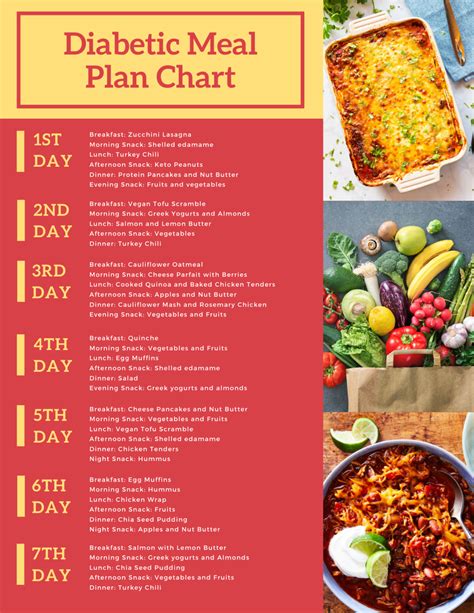
A diabetes meal plan is based on several key principles, including carbohydrate counting, portion control, and meal timing. Carbohydrate counting involves tracking the amount of carbohydrates in each meal to manage blood sugar levels. Portion control is essential to maintain a healthy weight and prevent overeating. Meal timing is also crucial, as it helps regulate blood sugar levels and prevent spikes.
To create a personalized meal plan, individuals with diabetes need to consider their lifestyle, food preferences, and nutritional needs. This includes factors such as age, sex, weight, height, and physical activity level. A registered dietitian or healthcare provider can help create a tailored meal plan that takes into account these factors.
Benefits of a Diabetes Meal Plan
A well-planned diabetes meal plan offers numerous benefits, including: * Improved blood sugar control * Weight management * Reduced risk of complications * Increased energy levels * Improved overall health and well-beingBy following a diabetes meal plan, individuals with diabetes can better manage their condition, reduce the risk of complications, and improve their overall quality of life.
Creating a Personalized Diabetes Meal Plan
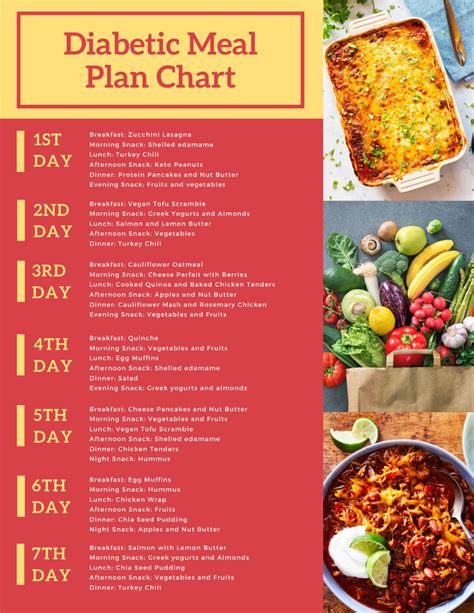
Creating a personalized diabetes meal plan involves several steps, including:
- Consulting with a registered dietitian or healthcare provider
- Setting nutritional goals and objectives
- Assessing lifestyle and food preferences
- Developing a meal plan that takes into account carbohydrate counting, portion control, and meal timing
A personalized meal plan should include a variety of whole, unprocessed foods, including:
- Vegetables: dark leafy greens, broccoli, bell peppers
- Fruits: berries, citrus fruits, apples
- Whole grains: brown rice, quinoa, whole wheat bread
- Lean proteins: chicken, fish, tofu
- Healthy fats: nuts, seeds, avocados
Practical Tips for Creating a Diabetes Meal Plan
Here are some practical tips for creating a diabetes meal plan: * Keep a food diary to track eating habits and blood sugar levels * Plan meals in advance to ensure healthy food choices * Shop for whole, unprocessed foods * Cook at home using healthy cooking methods * Eat regular meals to maintain stable blood sugar levelsBy following these tips and working with a registered dietitian or healthcare provider, individuals with diabetes can create a personalized meal plan that helps them manage their condition and improve their overall health and well-being.
Common Mistakes to Avoid in a Diabetes Meal Plan
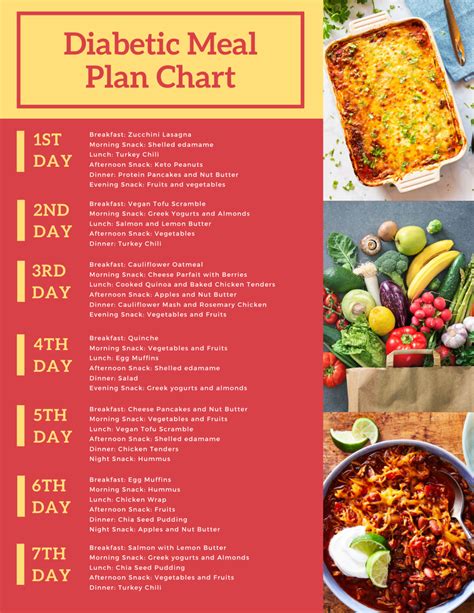
When creating a diabetes meal plan, there are several common mistakes to avoid, including:
- Not considering individual nutritional needs and lifestyle
- Not tracking carbohydrate intake
- Not eating regular meals
- Not staying hydrated
- Not being mindful of portion sizes
By avoiding these common mistakes, individuals with diabetes can create a personalized meal plan that helps them manage their condition and improve their overall health and well-being.
Managing Special Dietary Needs
Individuals with diabetes may have special dietary needs, such as vegetarian or vegan diets, gluten-free diets, or low-sodium diets. A registered dietitian or healthcare provider can help create a personalized meal plan that takes into account these special dietary needs.Here are some tips for managing special dietary needs:
- Consult with a registered dietitian or healthcare provider
- Research healthy food options that meet dietary needs
- Plan meals in advance to ensure healthy food choices
- Shop for whole, unprocessed foods that meet dietary needs
By managing special dietary needs, individuals with diabetes can create a personalized meal plan that helps them manage their condition and improve their overall health and well-being.
Staying Motivated and Engaged
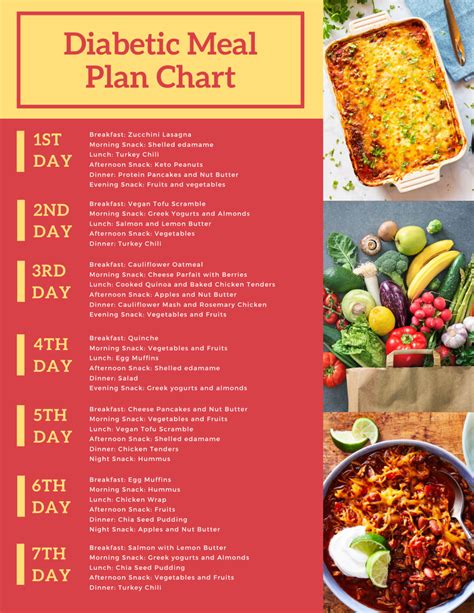
Staying motivated and engaged is crucial for managing diabetes and following a meal plan. Here are some tips for staying motivated:
- Set realistic goals and objectives
- Track progress and celebrate successes
- Find healthy recipes and cooking methods
- Connect with others who have diabetes
- Stay positive and focused on overall health and well-being
By staying motivated and engaged, individuals with diabetes can create a personalized meal plan that helps them manage their condition and improve their overall health and well-being.
Overcoming Challenges and Obstacles
Creating and following a diabetes meal plan can be challenging, especially when faced with obstacles such as emotional eating, social pressures, or lack of motivation. Here are some tips for overcoming challenges and obstacles: * Identify triggers and develop coping strategies * Seek support from family and friends * Stay positive and focused on overall health and well-being * Celebrate successes and learn from setbacks * Be patient and flexible when faced with challenges and obstaclesBy overcoming challenges and obstacles, individuals with diabetes can create a personalized meal plan that helps them manage their condition and improve their overall health and well-being.
Conclusion and Next Steps
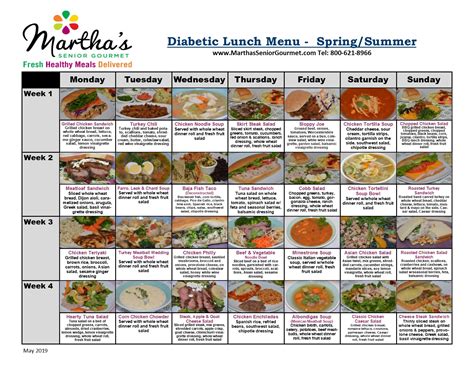
In conclusion, a diabetes meal plan is a powerful tool for managing diabetes and improving overall health and well-being. By understanding the basics of a diabetes meal plan, creating a personalized meal plan, and staying motivated and engaged, individuals with diabetes can take control of their condition and improve their quality of life.
If you're ready to take the next step, here are some next steps to consider:
- Consult with a registered dietitian or healthcare provider to create a personalized meal plan
- Start tracking your eating habits and blood sugar levels
- Explore healthy recipes and cooking methods
- Connect with others who have diabetes for support and motivation
- Stay positive and focused on overall health and well-being
We invite you to share your experiences and tips for managing diabetes and creating a personalized meal plan. Please comment below or share this article with others who may benefit from this information.
What is a diabetes meal plan?
+A diabetes meal plan is a personalized plan that helps individuals with diabetes manage their blood sugar levels and improve their overall health and well-being.
How do I create a personalized diabetes meal plan?
+To create a personalized diabetes meal plan, consult with a registered dietitian or healthcare provider, set nutritional goals and objectives, and assess your lifestyle and food preferences.
What are the benefits of a diabetes meal plan?
+The benefits of a diabetes meal plan include improved blood sugar control, weight management, reduced risk of complications, increased energy levels, and improved overall health and well-being.
